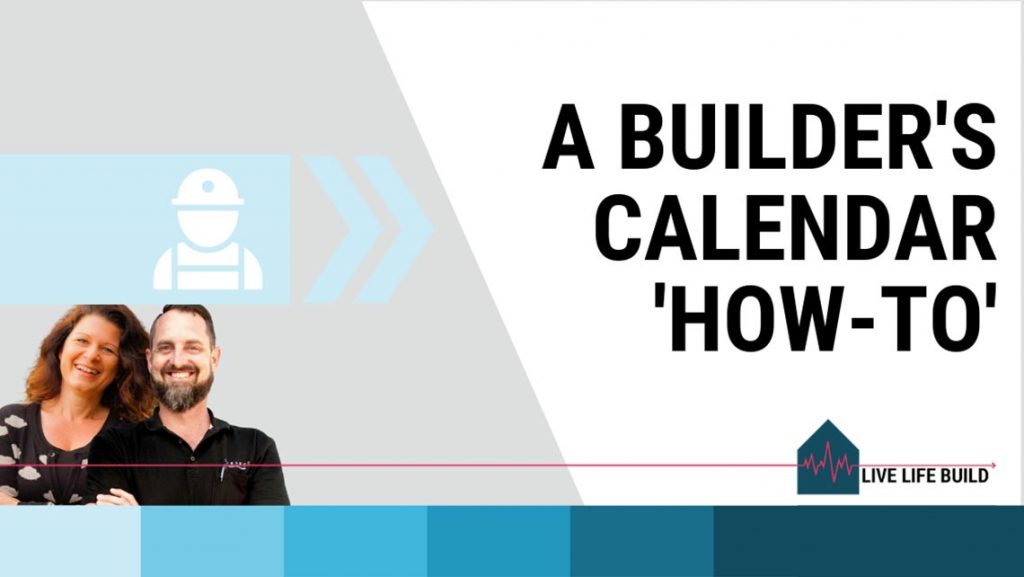Are you struggling with how to manage your time in your building business?
Read this for our key tips that will help you get your time back, and enable you to be doing more of what you enjoy.
In our last blog post, we shared the results of a market research study we conducted, that hundreds of Australian builders participated in.
In that research, we found that over two thirds of respondents strongly agreed that they wish they could learn more to run their business better, but never seem to have enough time.
Time is always a big factor for builders. Feeling like you don’t have enough time can keep you stuck in a hamster wheel, running on the spot as you try to stay on top of everything.
And if you’re not able to get out of that place, you’ll be most likely stressed, and not able to even think beyond the next few days, let alone make plans and goals for the bigger dreams you have about your life. You’ll be reacting, putting out fires, stuck in chaos, and complaining about it every step of the way.
There is a much better way to manage your time in a building business. Let us show you how to approach it instead.
5. WHAT ARE YOUR ‘BIG ROCKS’?
You may have heard this story before, but it’s worth mentioning, as it’s a great illustration of how to view your time, and why prioritising the things you spend your time on, is essential to ensuring you don’t miss out on the things that matter to you.
This is how the story goes …
A teacher stood up in front of the class room, and put an empty glass jar on the desk. She filled it with some rocks, until it reached the top, and she asked the class “is the jar full?” They replied, “yes it is.”
She then got out some pebbles, and started pouring those into the jar. They filled the crevices around the rocks, until they reached the top of the jar. Again, she asked the class “is the jar full?” They replied, “yes it is.”
Then she got out some sand, and she poured that into the jar. Again, it filled the crevices and spaces between the pebbles and the rocks, until it reached the top of the jar. She asked the class “is the jar full now?” They replied, “yes it is.”
Lastly, she got a jug of water. She poured the water into the jar, and slowly the items inside the jar got wet as the jar filled to the top. She asked the class again, “is the jar full?” Finally, sure it couldn’t fit anything else, they replied “yes, it is”.
The teacher explained that your life is like the jar. You can fit a lot of different things into your life and time, but unless you put them in in the right order, you won’t fit them in. She pointed out that if the water and sand had gone in first, the rocks would never have fit. The rocks had to go in first, so that all the other items could fit around them, and fill the gaps.
So, what are your big rocks? Because if you don’t get them in the jar (your life) first, they won’t fit.
Big rocks are things that are considered ‘mission-critical’. They’re your highest values or priorities. They’ll be different for everyone, but they can include family, your goals, your contribution, your education, and your personal well-being. Unless you prioritise them, it’s very easy for them to get left behind, and not fit into the jar at all.
We often say that family is the most important thing to us, but how we live our everyday lives is not in integrity with that at all.
We give ourselves the excuse that we’re running a business, or making sure bills get paid, but if we are really honest with ourselves, what would it look like to live in integrity with family being your highest priority?
How differently would you spend your time?

4. THE MINDSET FOR MANAGING YOUR TIME
Managing your time requires a specific mindset, because otherwise it is very easy to let your time (and other people) manage you.
Many builders will let their week, their month, their year (and very quickly, their life) be dictated to and determined by the needs of others. Living in a reactive way, where they are often frazzled, struggling to stay on top of things, and under the pump all the time.
However, no one is going to care about your time and your schedule – or your priorities – if you don’t.
You teach people how to treat you, and so as long as you’re allowing yourself to be pulled from pillar to post, it will keep on happening.
It is totally OK for you to have boundaries. In fact, it is necessary as a business owner to be in a position to serve your clients and your business to the best of your ability. Managing your time means setting boundaries on when and how you can be contacted, when and how you’re available and the way you spend your time on a daily basis.
Have you heard about Parkinson’s Law?
Parkinson’s Law is the old adage that work expands to fill the time allotted for its completion. The term was first coined by Cyril Northcote Parkinson in a humorous essay he wrote for “The Economist” in 1955. He shares the story of a woman whose only task in a day is to send a postcard – a task which would take a busy person approximately three minutes. But the woman spends an hour finding the card, another half hour looking for her glasses, 90 minutes writing the card, 20 minutes deciding whether or not to take an umbrella along on her walk to the mailbox … and on and on until her day is filled (source).
Think about it. When you’re super productive and focussed, and only give yourself a couple of hours to get a task done, you can usually nail it, and find you’re able to complete it.
However, give yourself eight hours to do that same task, and you’ll often stuff around, get distracted, and leave it to the last two hours to get done. And you’ll have wasted a day in the process.
Parkinson’s Law is great when thinking about how you allocate your time to tasks in your schedule. Don’t give yourself too much time. Constraint brings creativity, and can get great results.
The other is to realise that multitasking, in most cases, is not productive or even possible. According to research, only 2% of the population is able to multitask well.
The rest of us will find we lose huge amounts of productivity doing something known as ‘task-switching’ or ‘context switching’ – the act of moving quickly from one task to another.
It can take 15 minutes of uninterrupted time to get yourself absorbed in a task once started. Once interrupted, it can take 25 minutes to get yourself focussed again (source). In the process, you’re losing time, productivity and results.
This is why batching or bulk scheduling is such a powerful tool to use in your building business. Read on for more information about that.

3. PUTTING YOURSELF FIRST IN YOUR CALENDAR
Nothing works if you don’t. As a business owner, you are your business’ BIGGEST asset, and it’s essential that you actually treat yourself, and your health and well-being with that in mind.
Many builders really struggle with putting themselves first.
Perhaps it’s because if they did, they’d have to confront that they’re not as fit and healthy as they’d like to be.
Or that they’re not eating well, sleeping well, or dealing with personal issues that need addressing.
It can be much easier to stay busy, compartmentalise them, and keep on working hard.
Or it can be a case of simply not having enough time or bandwidth to consider that they need to be their biggest priority – because if they’re not, they put everything else in jeopardy.
Putting yourself first is not selfish. It’s actually sensible. It’s what sets up the success of your business long term. When you take care of your health and your well-being by doing something as simple as exercising regularly, you’ll give yourself the opportunity to sleep better.
Sleep better and you’ll be amazed at how much more focussed you can be. Be more focussed, and you’ll be surprised how much more productive you are with your day. Be more productive, and you’ll get more done in less time.
AND you’ll also open up your brain’s ability to think beyond the manic day-to-day, and to plan for the future, see opportunities, and start realising the bigger dreams you have for your business and life.
It all starts with you putting yourself first. Whether it’s to exercise, meditate, eat better, meet up with friends, have some fun and relax – you’ll be amazed at how much better it makes your business when you’re personally better.

2. SCHEDULING YOUR YEAR
One of the exercises we did at the beginning of this year with our Live Life Build members was to get them to schedule their whole year, starting with their big rocks.
This is a great exercise to do, and it can be done at any time of year. Don’t wait until New Years to adopt this strategy.
Take an annual calendar, and block out the times you want to prioritise for your biggest rock.
For many of our builder members, that’s family, and school holidays. They want to ensure they get some time away, or the ability to hang out with their kids, whilst they’re on their school break. Or it may be simply they want to schedule some holidays to get away with their family at specific times of the year.
Then you can schedule in other goals you might have. You may want to attend a conference, or set yourself a goal around your physical health. Perhaps it’s even simply highlighting that once a week, you’ll go for a big run with your partner or a friend.
Of course, your project schedules can go in there too – but if you’re prioritising your family as your highest value, then you’ll start to see where your project timing might need to shift and juggle to accommodate that.
Very quickly, you’ll see how your big rocks fill your annual calendar, and actually then start to limit the available time you have for the everyday tasks. Which is not a bad thing! If we think about Parkinson’s Law, what often happens is that, when you give yourself less time to do something, you’ll actually become more creative and innovative about how to complete that task.
Perhaps it means you need to change the task timeline. Perhaps you need to delegate part or all of the task. You’ll never know this whilst you’re flying by the seat of your plans, not scheduling your time, and allowing things to take as long as they take.
Scheduling your year like this puts boundaries around the time you want to dedicate to what’s most important to you, and then identifies the time you have left for the other things you need to do.
If you have a partner, it’s often worthwhile to do this annual scheduling together, and to then let that run through to your personal calendars, which (if digital) can be shared as well.

1. SCHEDULING YOUR WEEK
We encourage our builder members to spend time each Sunday planning their week ahead, and using the 6Ps to identify what they’ll be doing each week.
Many of our builder members are now doing this as a matter of course. Some have even brought it forward to the Friday afternoon the week prior. And they’re doing it on a two or three week rolling rotation.
If you’re scheduling your projects, this will be quite a straight forward task. You’ll be able to review your project schedules, and understand very easily what’s ahead for the week, who you need to call and organise and what tasks you’re expecting to achieve.
Of course, you need to do this weekly scheduling by starting with your big rocks too. Do you have days you want to take your kids to, or pick them up from school? Or perhaps a couple of nights a week, be home to cook dinner?
Maybe you want to schedule a weekly walk with a friend so you can combine exercise and catching up. Maybe you’ve got something you’re wanting to specifically improve, such as creating systems in your business. Block out some time in your schedule.
What gets scheduled, gets done.
We find builders who rigorously schedule their calendars each week are much more productive and focussed, and don’t let their time be stuffed around by others. Of course, unexpected things can come up, but you’ll be in a much better position (and frame of mind) to deal with them if you’re not running the rest of your week reactively as well.
Lastly, use batching, or block scheduling, to improve your productivity. Group together activities to get better results by working on them altogether in one hit. This will help you get that uninterrupted, focussed time, which will enable you to get through much more work than you would if it was being spread across your week.
This can mean blocking out a specific time each week to do all your invoicing or phonecalls or social media. Or it can mean ensuring that all your new client meetings happen on a specific day or days of the week.
And group your meetings together geographically, or better yet, run what you can virtually, so you’re not losing a lot of time on the road running from place to place.
So, if you want more time, then take the time to stop letting your time be stuffed around. You DO get to choose, and you get to set boundaries. But only if you make the time to do so.
So, here’s our 5, 4, 3, 2, 1 to identify your ideal project.
5. Have you asked your team what their goals are?
4. How can you help and facilitate your team’s goals?
3. What are your goals as a team?
2. Holding people accountable.
1. Celebrate the wins and create a good work environment.
Live Life Build’s 6P Methodology unlocks the 6 ways to elevate your building business:
PERSONAL | PROJECTS | PEOPLE | PARTNERSHIPS | PROCESSES | PROFESSIONAL
Want to learn how to be a better business owner? Learn the systems, marketing tools, mindset and business skills you need in our group program and mastermind, ELEVATE. Learn more here.

